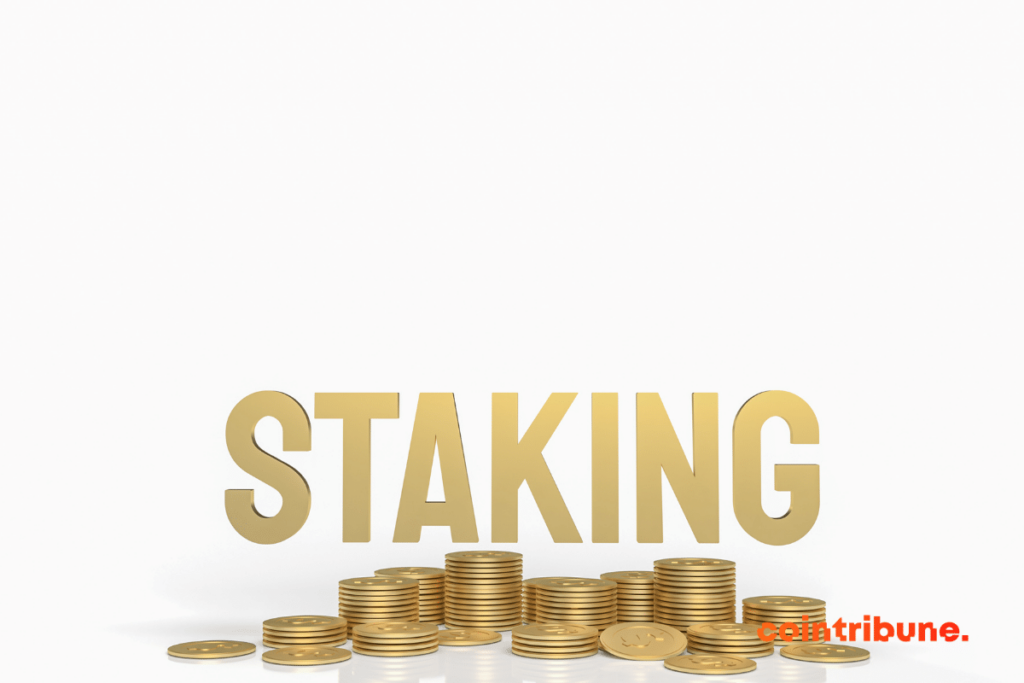How to Minimize Taxes with Staking?
Cryptocurrency staking is an increasingly popular method to grow digital assets. By locking up cryptos to support the operation of a blockchain network, investors can receive regular rewards. However, in France, these gains are taxed and must be treated with the same rigor as any other type of income. This article will examine the tax implications of staking and unveil strategies to minimize taxes on these earnings.

Cryptocurrency Staking and Its Tax Implications
Cryptocurrency staking is a practice that attracts many investors seeking returns on their digital assets. As a transaction validation mechanism for certain blockchains, staking allows holders of digital currencies to receive rewards in exchange for locking up their funds to support the network. However, in France, these staking rewards are considered income and are therefore subject to tax, necessitating special attention during tax filing.
The taxation of cryptocurrencies in France is governed by specific rules that classify staking gains as either industrial and commercial profits (BIC) or non-commercial profits (BNC), depending on the scale of staking activity. This distinction is crucial, as it determines the applicable tax regime and the amount of income tax to be paid. Investors must therefore declare their staking gains in their annual tax return, adhering to the regulatory framework in place for digital assets.
Declaring staking gains involves knowing the value of the cryptocurrencies at the time of receipt and any eventual sale. The fluctuating value of cryptos can complicate the calculation of owed tax, making detailed record-keeping and knowledge of tax obligations even more important. Investors should be aware that the taxation of staking gains can vary based on current fiscal policy and future legislative changes.
Finally, cryptocurrency investors must understand that the tax management of their staking gains is not static. With the constantly evolving tax legislation related to cryptocurrencies, they need to stay informed and regularly consult a tax advisor. This not only ensures compliance with tax requirements but also allows for the seizing of tax optimization opportunities that may emerge with the development of the cryptocurrency sector.

Strategies to Minimize Taxes Through Staking
Cryptocurrency staking has become a popular way to generate passive income for crypto investors. However, like any income, staking gains are subject to taxation. In France, where crypto taxation is specifically regulated, there are strategies to minimize the tax impact of these activities.
Choice of Tax Jurisdiction
Choosing the tax jurisdiction is a major consideration for cryptocurrency investors. Tax residents in France are taxed on their worldwide income, which includes staking gains. However, how these gains are taxed can vary significantly from one country to another. Staking strategies should therefore be adapted based on the prevailing tax laws, which may offer more favorable tax rates or incentives for crypto investors.
In the French context, staking gains are considered either industrial and commercial profits (BIC) or non-commercial profits (BNC), depending on the investor’s level of activity. The distinction between these two regimes can significantly impact the amount of tax to be paid. Investors must therefore evaluate their level of activity and declare their gains accordingly, taking into account possible deductions and exemptions.
Use of Retirement Accounts
Using retirement accounts to invest in staking can offer significant tax advantages. In France, certain retirement savings products allow for contributions to be deducted from the taxable base. Gains accumulated in these accounts can either be taxed at a reduced rate or taxed upon withdrawal, often at retirement, when the personal tax rate may be lower.
Investing in staking through these investment vehicles can thus be an effective strategy to defer taxation and potentially benefit from lower tax rates in the future. However, this strategy requires careful planning and a thorough understanding of the available retirement savings products and their tax treatment.
Reinvestment of Gains
Reinvesting staking gains is another strategy to minimize tax. By reinvesting the obtained rewards, investors can potentially defer the taxation of these gains until they realize a sale. This approach can be particularly advantageous if the investor anticipates a change in tax legislation or a shift to a lower tax bracket.
It is important to note that reinvestment must be done judiciously. Reinvested gains remain subject to tax when eventually withdrawn or sold, but this strategy allows investors to benefit from compound growth on their investments in the meantime.
Accurate Record-Keeping
Meticulous documentation and record-keeping are necessary for any tax strategy. For cryptocurrency investors, this means keeping detailed records of all staking transactions, including dates, amounts, the value of cryptos at the time of staking, and at the time of receiving rewards. This information will be useful for accurately calculating gains and losses for tax reporting. Accurate record-keeping helps not only to correctly declare income and calculate owed tax but is also indispensable in the event of a tax audit. Investors must ensure their tax declaration complies with the tax authority’s requirements to avoid errors that could result in penalties.
Cryptocurrency staking represents an opportunity to generate passive income, but it requires a thorough understanding of applicable taxation. In France, investors must operate with caution, declaring their gains according to the tax authorities’ guidelines. Vigilance and accurate record-keeping are important to ensure compliance and minimize owed tax. It is advisable to consult a tax expert to avoid mistakes and stay updated on changing legislation and optimize the tax situation concerning staking activities.
Maximize your Cointribune experience with our "Read to Earn" program! For every article you read, earn points and access exclusive rewards. Sign up now and start earning benefits.
The Cointribune editorial team unites its voices to address topics related to cryptocurrencies, investment, the metaverse, and NFTs, while striving to answer your questions as best as possible.
The views, thoughts, and opinions expressed in this article belong solely to the author, and should not be taken as investment advice. Do your own research before taking any investment decisions.